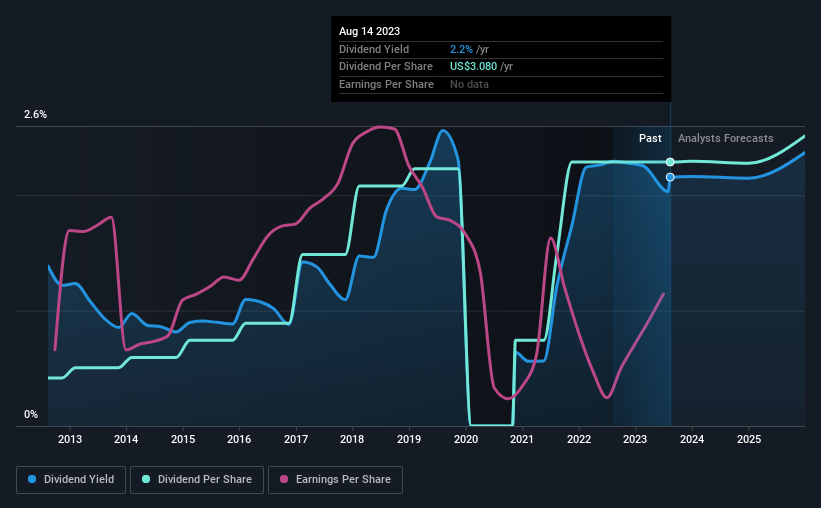Lear Corporation (NYSE:LEA) will pay a dividend of $0.77 on the 19th of September. This means the dividend yield will be fairly typical at 2.2%.
Check out our latest analysis for Lear
Lear's Dividend Is Well Covered By Earnings
Solid dividend yields are great, but they only really help us if the payment is sustainable. However, Lear's earnings easily cover the dividend. This means that most of its earnings are being retained to grow the business.
The next year is set to see EPS grow by 183.7%. Assuming the dividend continues along recent trends, we think the payout ratio could be 14% by next year, which is in a pretty sustainable range.

Dividend Volatility
The company has a long dividend track record, but it doesn't look great with cuts in the past. The dividend has gone from an annual total of $0.56 in 2013 to the most recent total annual payment of $3.08. This works out to be a compound annual growth rate (CAGR) of approximately 19% a year over that time. Lear has grown distributions at a rapid rate despite cutting the dividend at least once in the past. Companies that cut once often cut again, so we would be cautious about buying this stock solely for the dividend income.
Dividend Growth Potential Is Shaky
Growing earnings per share could be a mitigating factor when considering the past fluctuations in the dividend. Lear's earnings per share has shrunk at 15% a year over the past five years. Such rapid declines definitely have the potential to constrain dividend payments if the trend continues into the future. On the bright side, earnings are predicted to gain some ground over the next year, but until this turns into a pattern we wouldn't be feeling too comfortable.
In Summary
Overall, it's nice to see a consistent dividend payment, but we think that longer term, the current level of payment might be unsustainable. The payments haven't been particularly stable and we don't see huge growth potential, but with the dividend well covered by cash flows it could prove to be reliable over the short term. We don't think Lear is a great stock to add to your portfolio if income is your focus.
Companies possessing a stable dividend policy will likely enjoy greater investor interest than those suffering from a more inconsistent approach. At the same time, there are other factors our readers should be conscious of before pouring capital into a stock. For example, we've picked out 2 warning signs for Lear that investors should know about before committing capital to this stock. Is Lear not quite the opportunity you were looking for? Why not check out our selection of top dividend stocks.
New: AI Stock Screener & Alerts
Our new AI Stock Screener scans the market every day to uncover opportunities.
• Dividend Powerhouses (3%+ Yield)
• Undervalued Small Caps with Insider Buying
• High growth Tech and AI Companies
Or build your own from over 50 metrics.
Have feedback on this article? Concerned about the content? Get in touch with us directly. Alternatively, email editorial-team (at) simplywallst.com.
This article by Simply Wall St is general in nature. We provide commentary based on historical data and analyst forecasts only using an unbiased methodology and our articles are not intended to be financial advice. It does not constitute a recommendation to buy or sell any stock, and does not take account of your objectives, or your financial situation. We aim to bring you long-term focused analysis driven by fundamental data. Note that our analysis may not factor in the latest price-sensitive company announcements or qualitative material. Simply Wall St has no position in any stocks mentioned.
About NYSE:LEA
Lear
Designs, develops, engineers, manufactures, assembles, and supplies automotive seating, and electrical distribution systems and related components for automotive original equipment manufacturers in North America, Europe, Africa, Asia, and South America.
Flawless balance sheet, undervalued and pays a dividend.
Similar Companies
Market Insights
Community Narratives



